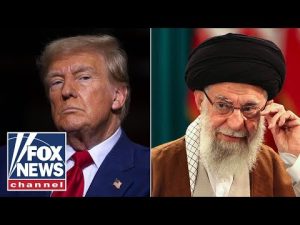A bipartisan group of House members recently returned from a trip to the Middle East, where they engaged in discussions with allies in Bahrain and the United Arab Emirates. Among them was Republican Congressman Zach Nunn, who emphasized the importance of having bipartisan delegations on the ground, especially with the changing dynamics in the region. But the real elephant in the room isn’t just the alliances; it’s the ongoing debate on how the U.S. should handle the situation with Iran.
Congress is in upheaval over whether the U.S. should take military action against Iran. The question looming large over Washington is if Congress should authorize such action. Democrat Ro Khanna expressed frustration with Senate Majority Leader Chuck Schumer for his non-committal approach. Should he be surprised, really? Politicians are notorious for saying a lot of nothing, and this seems to be yet another instance. Instead of giving a straightforward answer, Schumer left doors open for more confusion than clarity.
On the Republican side, Thomas Massie is pushing for legislation to prevent the U.S. from taking steps toward bombing Iran. Meanwhile, Democrat Tim Kaine plans to force a vote on American military intervention. The GOP faces a familiar conundrum—balancing their support for President Trump’s foreign policy stance, which notably champions staying out of unnecessary wars, while avoiding putting too many constraints on his decision-making abilities. After all, if there’s one thing consistent in politics, it’s that Congress loves a good internal struggle.
The delegation’s Middle East trip shed more light on the anxiety of Gulf states. They are stuck between a rock and a hard place, nervous about both an American strike sparking unrest and the looming threat of a nuclear-armed Iran. It’s a complicated juggling act where everyone wants de-escalation but no one wants to be the first to lower the tension levels. It’s like a global game of chicken with more at stake than just pride.
In the middle of all this, Chuck Schumer finds himself awkwardly positioned. As the highest-ranking Jewish lawmaker, supporting Israel is naturally a part of his political DNA. But there’s also a reluctance to hand over more power to President Trump. Navigating between these political and personal tides will undoubtedly be a challenge, even for someone as seasoned as Schumer. Yet, given his recent performance, a clear path forward might just be too ambitious of an expectation.







